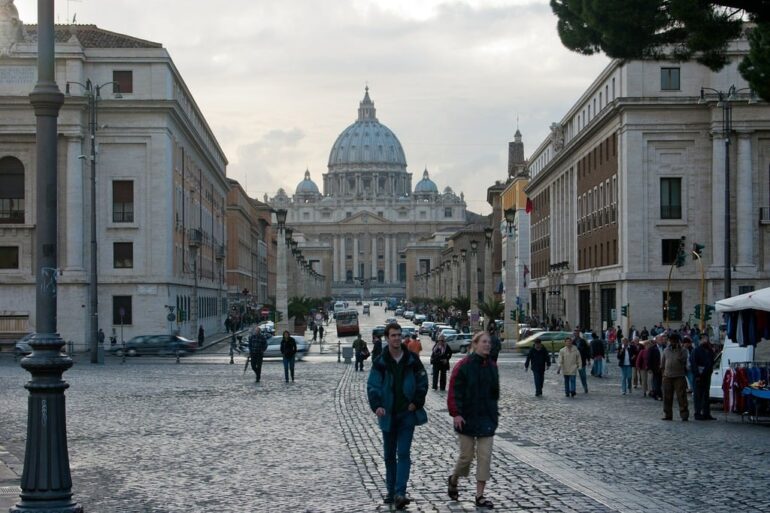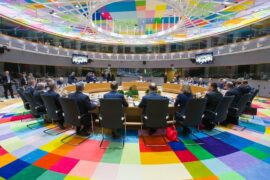Pope Francis, head of the Catholic Church since 2013, died last week.
In response, Israeli President Yitzḥak Herzog tweeted his condolences on X.
“I send my deepest condolences to the Christian world and especially the Christian communities in Israel – the Holy Land – on the loss of their great spiritual father, His Holiness Pope Francis. A man of deep faith and boundless compassion, he dedicated his life to uplifting the poor and calling for peace in a troubled world. He rightly saw great importance in fostering strong ties with the Jewish world and in advancing interfaith dialogue as a path toward greater understanding and mutual respect.”
In his role as president of Israel, many consider such diplomatic niceties as his sole responsibility outside of election cycles. But many Israelis were frustrated by the president’s whitewashing of the pope’s critical attitude towards the ongoing war in Gaza, and the generally anti-Jewish history of the papacy.
Others have attempted to adopt a more nuanced approach, acknowledging the uniquely anti-Semitic history of the Catholic church and the papacy while expressing appreciation for Francis’s continued efforts towards reconciliation between Catholics and Jews.
But all of these responses miss the larger issue at hand. The theological foundations, both for the pope’s conciliatory attitude towards Jews, and for the staunch pacifism behind his critique of the Gaza war, lie in The Second Vatican Council, which codified the Catholic church’s attitudes towards modernity in the mid-20th Century.
While certain positions were softened to adapt to modernity, such as blaming all Jews in all generations for the execution of their false god, the deeper theology remained the same.
In Nostra Aetate, which aimed to express a formal position on the church’s relationship to other religions, the church reaffirmed the supersessionist core of its theology, claiming that Jews and gentiles are one, and that the true redemption will be when Jews and gentiles alike accept Christianity.
These positions are perfectly summed up in the line, “Though the Church is the new people of God, the Jews should not be presented as rejected or accursed by God.”
In other words, in the foundational document of the Catholic church’s reconciliation with Jews that President Herzog called “a path toward greater understanding and mutual respect,” the church affirmed that while God doesn’t hate Jews, He has decided that He prefers Christians.
In light of the countless midrashim that compare Israel’s relationship to HaShem with the relationship between a bride and her groom, the essence of Christian theology is that the Creator decided to “take a mistress.”
The only novelty in Vatican II is that it replaced a “messy divorce” with an “open relationship.”
This appalling approach is the core of Christian belief. It asserts that humanity has moved beyond the need for Israel. That the Creator’s promises to our ancestors were fulfilled – or renegotiated – through the church, through acceptance of Christianity, rather than through the eternal Torah that was given to the children of Israel at Sinai.
Rooted in ancient philosophies of free will, like that of Plato, the Divine revelation to humanity is reduced from the prophetic reality of a living “kingdom of priests” to the all-too-human understandings of mankind, or in the Catholic case, a single man – the pope.
It is thus unsurprising that the pope, “dedicated his life to uplifting the poor and calling for peace in a troubled world,” according to his and his predecessors’ understandings of morality. While working to “uplift the poor,” the pope never called upon the Catholic president of the wealthiest nation in the world to make that imperative a national one. In fact, the Christian rejection of Israel is the rejection of a national framework for revealing the Divine will.
While “calling for peace in a troubled world,” the pope followed in the footsteps of his 20th Century predecessors, who turned their guilt over centuries of war waged in their name into a broad rejection of all militancy, going far beyond the bounds of “Just War Theory” laid out by Christian theologians like Augustine and Aquinas, preferring what “seems right” and “feels right” in the eyes of Francis and his predecessors.
As HaRav Zvi Yehuda HaKohen Kook teaches us, “Christianity has placed stumbling blocks in the way of the historical progression of the spiritual trajectory of man, and its development.”
By claiming to have replaced Israel – even if Israel is no longer hated, by claiming that humanity can find salvation through a false god – even if that false god drew from the Jewish tradition into which he was born, Christianity has muddied the waters of humanity’s innate sense of moral clarity, and distanced the world from realizing its potential.
As HaShem promised Avraham, the potential to correct the world can only be realized when the nations recognize that Israel is the channel through which the Divine blessing enters our world. As long as Christians fail to recognize this, and continue to insist that the church is the new Israel and that their path is a new covenant, the world will remain deeply troubled.
So, as we bid farewell to one pope, and anticipate the ascension of another, Israel should take a moment to clarify for ourselves: the salvation of the world, the end to poverty and war, the triumph of justice, cannot come through accepting the Christian attempts to blur the boundaries between our two paths.
At this critical juncture, we must decide to be “the head and not the tail,” to lead the world, rather than tailing others, and to be a moral example to humanity of the national manifestation of HaShem’s blessing.





